8.9 KiB
CDDFuse
Codes for CDDFuse: Correlation-Driven Dual-Branch Feature Decomposition for Multi-Modality Image Fusion. (CVPR 2023)
Zixiang Zhao, Haowen Bai, Jiangshe Zhang, Yulun Zhang, Shuang Xu, Zudi Lin, Radu Timofte and Luc Van Gool.
-[Paper]*
-[ArXiv]*
-*[Supplementary Materials]*
Update
- [2023/6] Training codes and config files are public available.
- [2023/4] Release inference code for infrared-visible image fusion and medical image fusion.
Citation
@InProceedings{Zhao_2023_CVPR,
author = {Zhao, Zixiang and Bai, Haowen and Zhang, Jiangshe and Zhang, Yulun and Xu, Shuang and Lin, Zudi and Timofte, Radu and Van Gool, Luc},
title = {CDDFuse: Correlation-Driven Dual-Branch Feature Decomposition for Multi-Modality Image Fusion},
booktitle = {Proceedings of the IEEE/CVF Conference on Computer Vision and Pattern Recognition (CVPR)},
month = {June},
year = {2023},
pages = {5906-5916}
}
Abstract
Multi-modality (MM) image fusion aims to render fused images that maintain the merits of different modalities, e.g., functional highlight and detailed textures. To tackle the challenge in modeling cross-modality features and decomposing desirable modality-specific and modality-shared features, we propose a novel Correlation-Driven feature Decomposition Fusion (CDDFuse) network. Firstly, CDDFuse uses Restormer blocks to extract cross-modality shallow features. We then introduce a dual-branch Transformer-CNN feature extractor with Lite Transformer (LT) blocks leveraging long-range attention to handle low-frequency global features and Invertible Neural Networks (INN) blocks focusing on extracting high-frequency local information. A correlation-driven loss is further proposed to make the low-frequency features correlated while the high-frequency features uncorrelated based on the embedded information. Then, the LT-based global fusion and INN-based local fusion layers output the fused image. Extensive experiments demonstrate that our CDDFuse achieves promising results in multiple fusion tasks, including infrared-visible image fusion and medical image fusion. We also show that CDDFuse can boost the performance in downstream infrared-visible semantic segmentation and object detection in a unified benchmark.
🌐 Usage
⚙ Network Architecture
Our CDDFuse is implemented in net.py.
🏊 Training
1. Virtual Environment
# create virtual environment
conda create -n cddfuse python=3.8.10
conda activate cddfuse
# select pytorch version yourself
# install cddfuse requirements
pip install -r requirements.txt
2. Data Preparation
Download the MSRS dataset from this link and place it in the folder './MSRS_train/'.
3. Pre-Processing
Run
python dataprocessing.py
and the processed training dataset is in './data/MSRS_train_imgsize_128_stride_200.h5'.
4. CDDFuse Training
Run
python train.py
and the trained model is available in './models/'.
🏄 Testing
1. Pretrained models
Pretrained models are available in './models/CDDFuse_IVF.pth' and './models/CDDFuse_MIF.pth', which are responsible for the Infrared-Visible Fusion (IVF) and Medical Image Fusion (MIF) tasks, respectively.
2. Test datasets
The test datasets used in the paper have been stored in './test_img/RoadScene', './test_img/TNO' for IVF, './test_img/MRI_CT', './test_img/MRI_PET' and './test_img/MRI_SPECT' for MIF.
Unfortunately, since the size of MSRS dataset for IVF is 500+MB, we can not upload it for exhibition. It can be downloaded via this link. The other datasets contain all the test images.
3. Results in Our Paper
If you want to infer with our CDDFuse and obtain the fusion results in our paper, please run
python test_IVF.py
for Infrared-Visible Fusion and
python test_MIF.py
for Medical Image Fusion.
The testing results will be printed in the terminal.
The output for 'test_IVF.py' is:
================================================================================
The test result of TNO :
EN SD SF MI SCD VIF Qabf SSIM
CDDFuse 7.12 46.0 13.15 2.19 1.76 0.77 0.54 1.03
================================================================================
================================================================================
The test result of RoadScene :
EN SD SF MI SCD VIF Qabf SSIM
CDDFuse 7.44 54.67 16.36 2.3 1.81 0.69 0.52 0.98
================================================================================
which can match the results in Table 1 in our original paper.
The output for 'test_MIF.py' is:
================================================================================
The test result of MRI_CT :
EN SD SF MI SCD VIF Qabf SSIM
CDDFuse_IVF 4.83 88.59 33.83 2.24 1.74 0.5 0.59 1.31
CDDFuse_MIF 4.88 79.17 38.14 2.61 1.41 0.61 0.68 1.34
================================================================================
================================================================================
The test result of MRI_PET :
EN SD SF MI SCD VIF Qabf SSIM
CDDFuse_IVF 4.23 81.69 28.04 1.87 1.82 0.66 0.65 1.46
CDDFuse_MIF 4.22 70.74 29.57 2.03 1.69 0.71 0.71 1.49
================================================================================
================================================================================
The test result of MRI_SPECT :
EN SD SF MI SCD VIF Qabf SSIM
CDDFuse_IVF 3.91 71.81 20.66 1.9 1.87 0.65 0.68 1.45
CDDFuse_MIF 3.9 58.31 20.87 2.49 1.35 0.97 0.78 1.48
================================================================================
which can match the results in Table 5 in our original paper.
🙌 CDDFuse
Illustration of our CDDFuse model.

Qualitative fusion results.

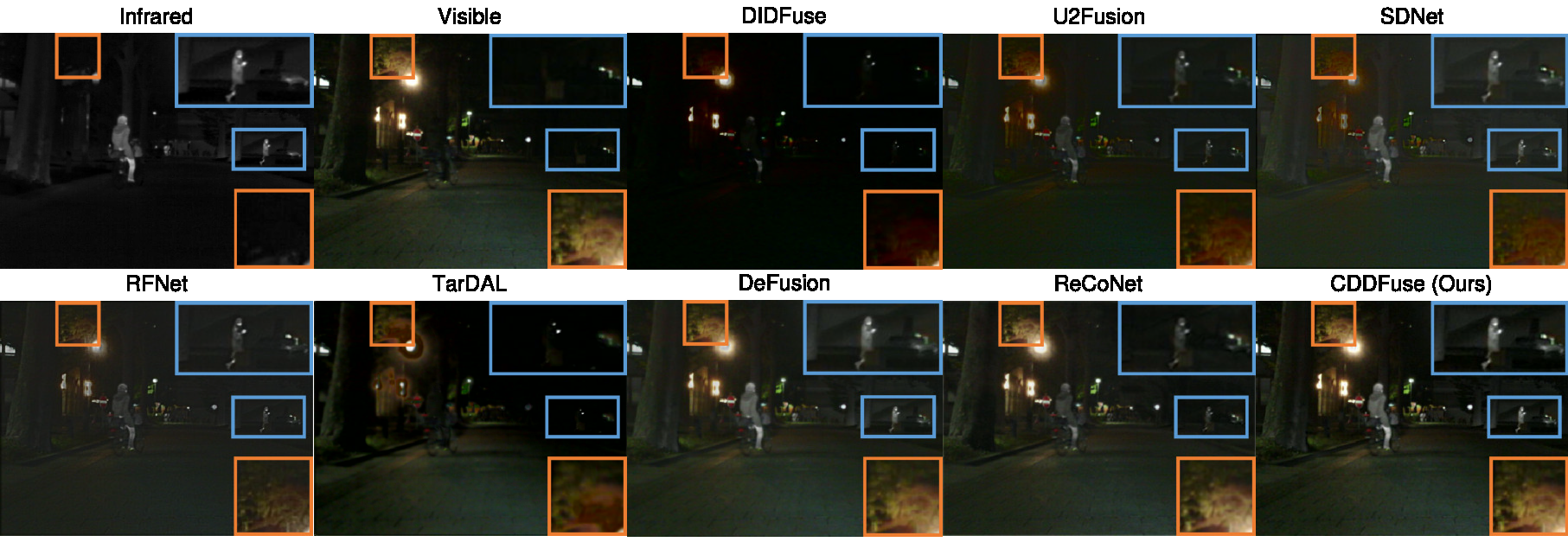
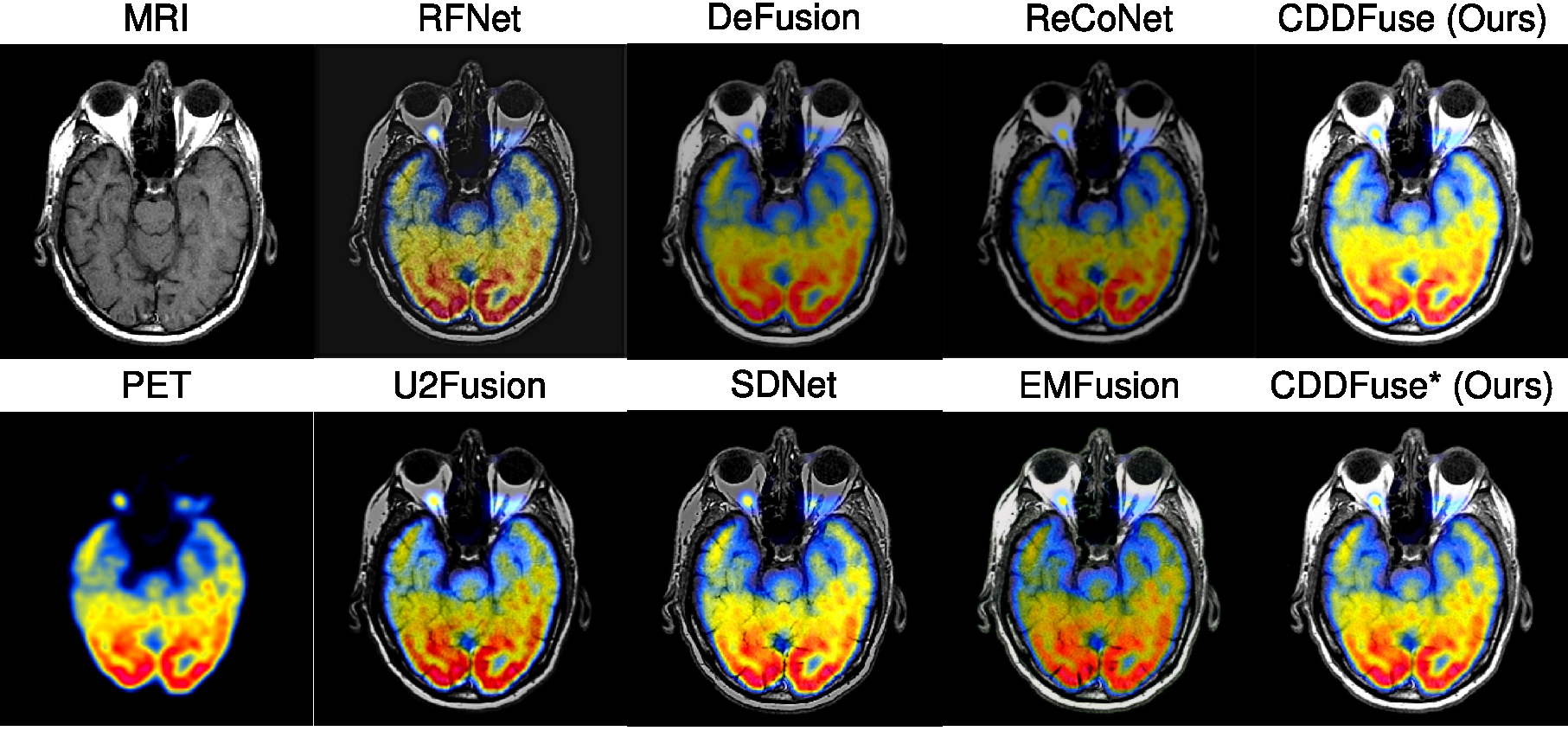
Quantitative fusion results.
Infrared-Visible Image Fusion
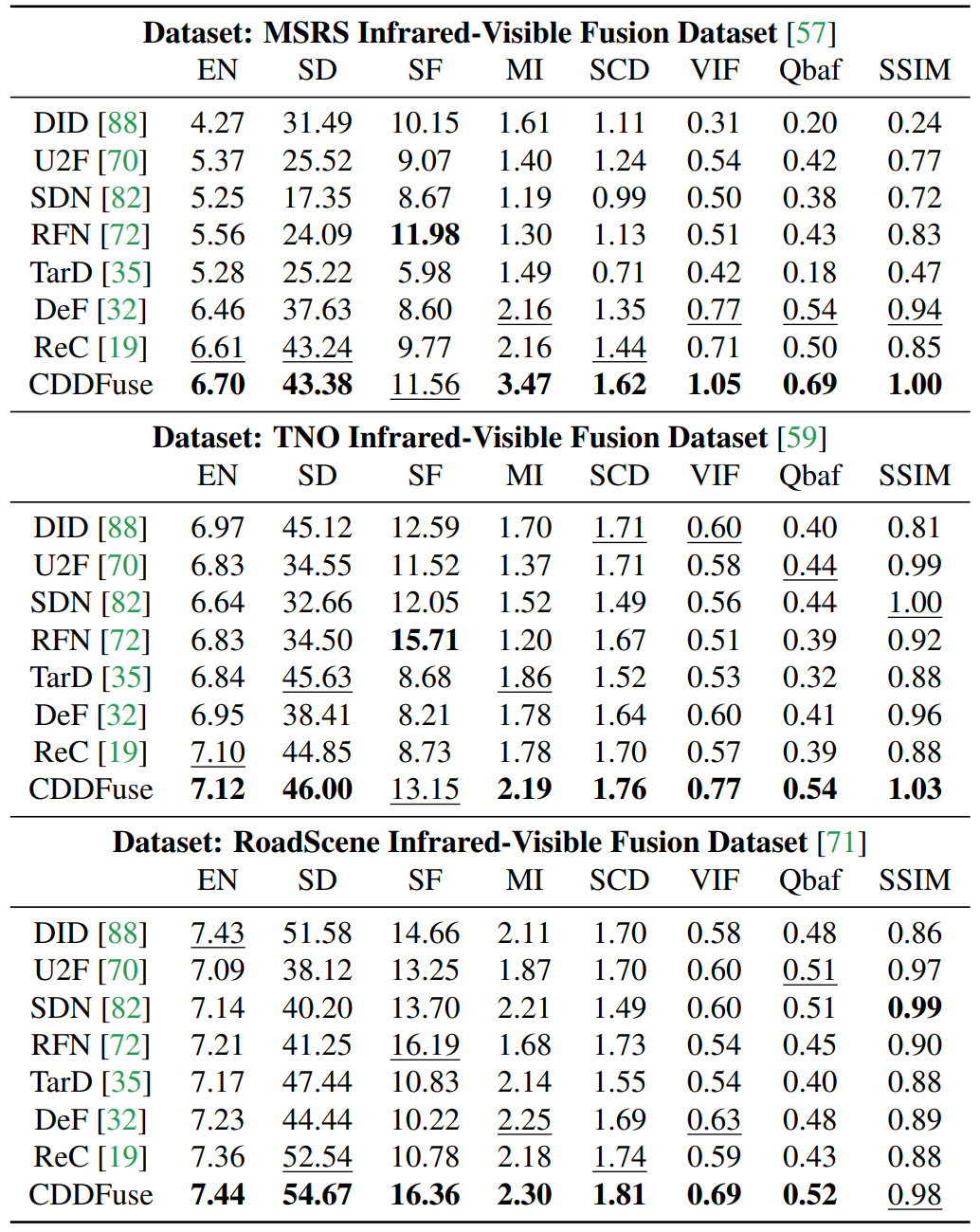
Medical Image Fusion
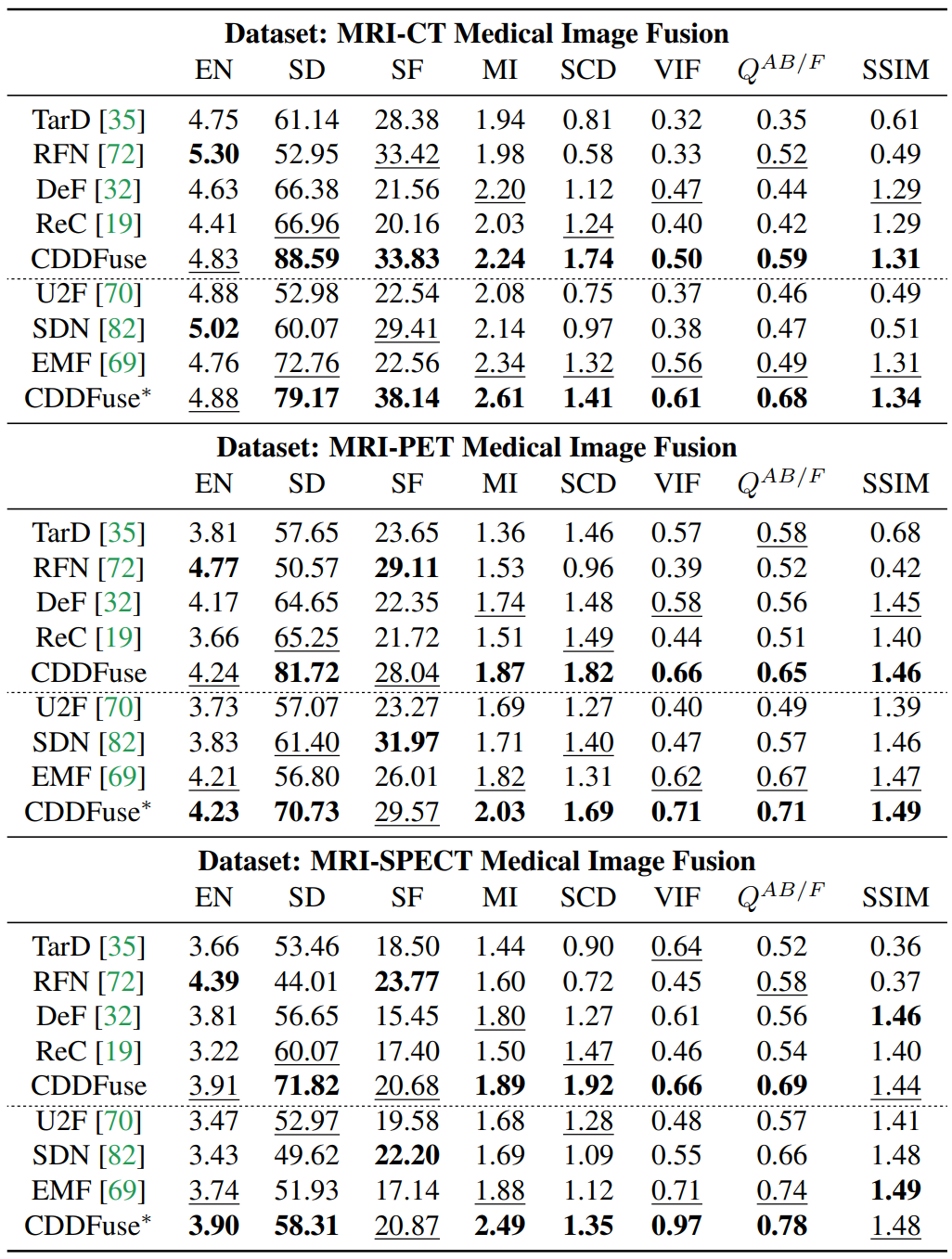
MM detection
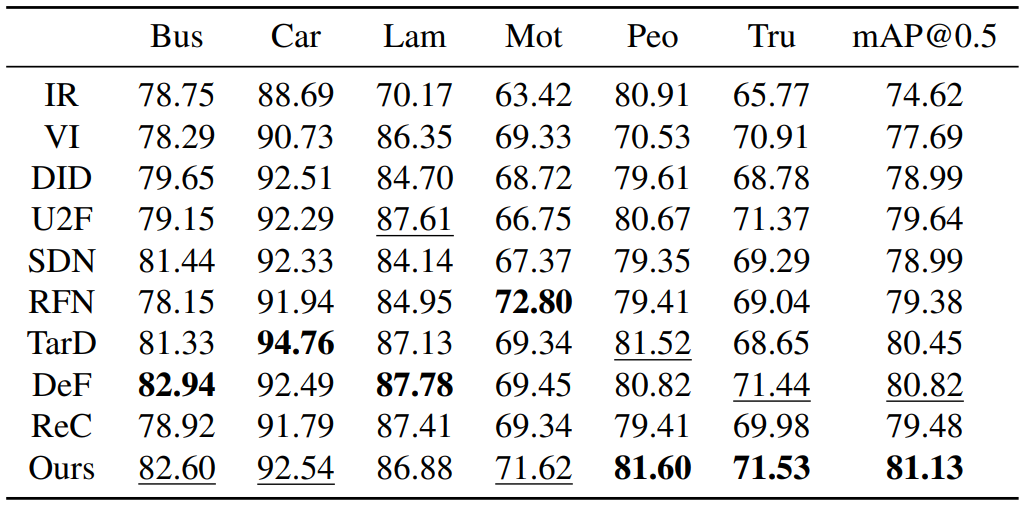
MM segmentation
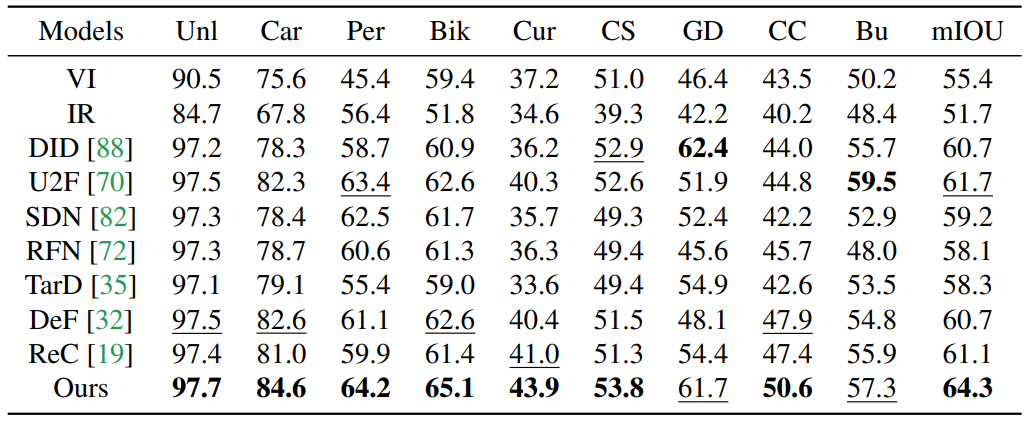
📖 Related Work
-
Zixiang Zhao, Haowen Bai, Jiangshe Zhang, Yulun Zhang, Kai Zhang, Shuang Xu, Dongdong Chen, Radu Timofte, Luc Van Gool. Equivariant Multi-Modality Image Fusion. arXiv:2305.11443, https://arxiv.org/abs/2305.11443
-
Zixiang Zhao, Haowen Bai, Yuanzhi Zhu, Jiangshe Zhang, Shuang Xu, Yulun Zhang, Kai Zhang, Deyu Meng, Radu Timofte, Luc Van Gool. DDFM: Denoising Diffusion Model for Multi-Modality Image Fusion. arXiv:2303.06840, https://arxiv.org/abs/2303.06840
-
Zixiang Zhao, Shuang Xu, Chunxia Zhang, Junmin Liu, Jiangshe Zhang and Pengfei Li. DIDFuse: Deep Image Decomposition for Infrared and Visible Image Fusion. IJCAI 2020, https://www.ijcai.org/Proceedings/2020/135.
-
Zixiang Zhao, Shuang Xu, Jiangshe Zhang, Chengyang Liang, Chunxia Zhang and Junmin Liu. Efficient and Model-Based Infrared and Visible Image Fusion via Algorithm Unrolling. IEEE Transactions on Circuits and Systems for Video Technology 2021, https://ieeexplore.ieee.org/document/9416456.
-
Zixiang Zhao, Jiangshe Zhang, Haowen Bai, Yicheng Wang, Yukun Cui, Lilun Deng, Kai Sun, Chunxia Zhang, Junmin Liu, Shuang Xu. Deep Convolutional Sparse Coding Networks for Interpretable Image Fusion. CVPR Workshop 2023. https://robustart.github.io/long_paper/26.pdf.
-
Zixiang Zhao, Shuang Xu, Chunxia Zhang, Junmin Liu, Jiangshe Zhang. Bayesian fusion for infrared and visible images. Signal Processing, https://doi.org/10.1016/j.sigpro.2020.107734.